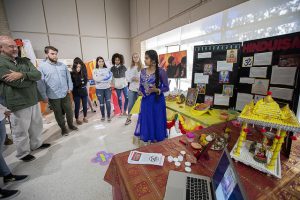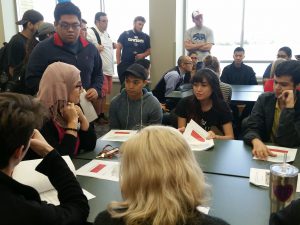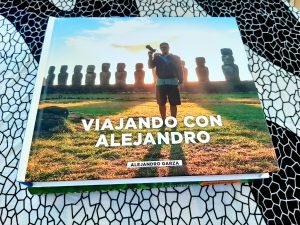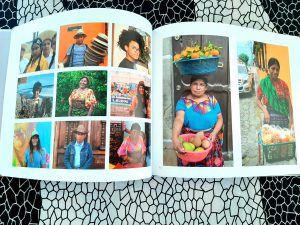When I connected via telephone with Professor Laura Wood, she was working from home, just like other TCC faculty and staff, due to COVID-19. One of the first things we talked about was how we were adjusting to this new way of working, and how this was impacting students. “You know, global learning is all about helping students create a mindset that they are part of global life, that they are connected to the world in ways that they don’t understand,” Wood said. She went on, “COVID-19 is a vivid example of how we are more connected than we realize. It does not discriminate.”
 Emphasizing global learning and global connectedness are not new concepts at TCC. Faculty at TCC Northwest have been engaged in creating global learners for quite some time. For Professor Tony Roberts, one of the first ways he engaged students in global learning was through the cultural feast, which he began 15 years ago.
Emphasizing global learning and global connectedness are not new concepts at TCC. Faculty at TCC Northwest have been engaged in creating global learners for quite some time. For Professor Tony Roberts, one of the first ways he engaged students in global learning was through the cultural feast, which he began 15 years ago.
The cultural feast is a day where students create multi-dimensional, multi-sensory experiential tables where they present research they have done on festivals and celebrations of other cultures. “The food is a draw,” Roberts said. “When you walk into that space, and you smell the food and the incense, you hear the drums, and you see the dancing – it just draws people in. You can’t walk past it without wondering what the heck is going on. People want to stop in and learn.”
Several years ago, Wood and Roberts began collaborating, and the Cultural Feast was expanded into an entire week called Global Citizenship Week. In addition to the Cultural Feast, the week also includes a Global Connection event that allows TCC students to connect to students around the world via video conference as well as a speed dating type event that features TCC faculty and staff who identify with different ethnicities and cultures.
 In groups, students get to spend about 10 minutes at each presenter’s table, asking any questions they would like about their hosts’ home country. Faculty such as Peter Doas and Daiju Hoshino as well as staff such as Suresh Venugopal and Rahma Aboutaj, have participated. They bring artifacts from their home countries like books and pictures, as well as food for their tables. “It’s been a big eye-opener for students,” Wood said. “They really love it.”
In groups, students get to spend about 10 minutes at each presenter’s table, asking any questions they would like about their hosts’ home country. Faculty such as Peter Doas and Daiju Hoshino as well as staff such as Suresh Venugopal and Rahma Aboutaj, have participated. They bring artifacts from their home countries like books and pictures, as well as food for their tables. “It’s been a big eye-opener for students,” Wood said. “They really love it.”
In addition to Global Citizenship week, faculty have also incorporated global learning into their classrooms. Wood believes her background studying military history really shapes her perspective on global learning. “Military history was one of the earliest global disciplines because you have to learn the whole history,” Wood said. She continued, “When I teach subjects like U.S. History, I come at it from a more holistic, global perspective.”
 Alejandro Garza, professor of Spanish, used to do study abroad trips with his students to Costa Rica. Travel is a passion for Garza, who is on his way to visiting every country in the world. When I reached him at home, he was just on the other side of 14 days of self-isolation due to his trip to Spain during Spring Break. “I was very lucky. I was able to get back to the U.S. through France without any issue. A lot of people I know got stranded at the airports for a while,” he said.
Alejandro Garza, professor of Spanish, used to do study abroad trips with his students to Costa Rica. Travel is a passion for Garza, who is on his way to visiting every country in the world. When I reached him at home, he was just on the other side of 14 days of self-isolation due to his trip to Spain during Spring Break. “I was very lucky. I was able to get back to the U.S. through France without any issue. A lot of people I know got stranded at the airports for a while,” he said.
While he loves to travel, Garza has found other ways to connect his students to the broader world. “I remember one year we were not able to make the Costa Rica trip happen,” Garza said. “My department chair at the time, Tina Ross, told me that I should bring Costa Rica to my students. So, that’s what we did.” Garza and other Spanish faculty began bringing in speakers from all over the world.
Spanish faculty also plan celebrations and student projects around multiple holidays celebrated in the Spanish-speaking world, including a big Día de los Muertos celebration that includes costumes and food. Students taking Spanish classes are required to attend a cultural event that relates to Hispanic culture. The students must speak Spanish at the event and write about their experience in Spanish. He said that learning a language is not just about the vocabulary and the grammar, but also about the culture and the ways in which all cultures intersect. “There is a global element to every class meeting,” he said.
 Two years ago, Garza took Faculty Development Leave. During his time away from the classroom he traveled to every Spanish-speaking country in the world except Venezuela. This included a trip to Equatorial Guinea in Africa, one of the least-visited countries on the planet.
Two years ago, Garza took Faculty Development Leave. During his time away from the classroom he traveled to every Spanish-speaking country in the world except Venezuela. This included a trip to Equatorial Guinea in Africa, one of the least-visited countries on the planet.
To get to some Spanish-speaking countries, he had to travel through non-Spanish-speaking countries. He found Hispanic influences in all of them. Now he uses those experiences, and his photos, in his teaching. “I tell my students, now we are going to travel with my photos, and we are going to travel with Google.”
After he returned from his Faculty Development Leave, Garza published a photobook of his travels called Viajando con Alejandro. Garza donates proceeds from his book and the sale of photographs to a scholarship that helps TCC students study internationally.
Roberts also brings a global focus to his classes. This semester he tried something new by incorporating into his classes the Soliya Global Exchange, a program designed to connect students around the world to each other through video chats. To participate in this program, Roberts’ students agree to be available early in the morning or in the evening because of the time differences around the world. Despite this hurdle, and despite the challenges presented by COVID-19, Roberts said his students are really engaged with the program. “You know, COVID-19 is an awful thing, but it becomes instantly something these students can relate to with each other,” Roberts said. He went on, “The Soliya program has also allowed them to move beyond the more basic level of cultural exchange where they talk to each other about how they are all experiencing COVID-19 in different ways into a deeper level of global understanding as they discuss global interconnectedness, like how supply chains in China affect everybody or, for example, in our current situation, does it matter that not everyone in the world has access to education—they see now how that affects everybody.”
There are many more global learning opportunities on the horizon for students at TCC Northwest. This spring semester, Wood was instrumental in securing Salamatou Abdourahamae Illiassou, a Fulbright scholar and professor from the University of Diffa in Niger. The intention was to have a whole week dedicated to global studies featuring Illiassou. That has been put on hold for now, but there are plans to get students involved with Illiassou through video chat and, through the Fulbright Outreach Lecture fund, Wood may be able to bring Illiassou to campus in the next academic year, either in person or through video conference.
Wood says it is important to use technology to bring global experiences to campus. “Less than 10 percent of four-year university students get to study internationally and, for students at two-year colleges, it’s less than 1 percent. There are just very few of our students that can afford the cost, so it’s important to use technology to help our students make those connections and be globally educated.”
